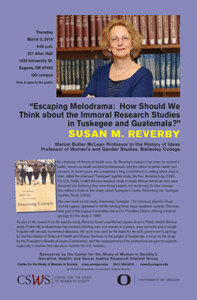Narrative, Health, and Social Justice is a space for a critical, feminist inquiry into health and health disparities as these are structured and experienced according to race, gender, and social position in the United States and globally. We seek to apply a narrative approach to understanding biomedicine as a cultural system, to the personal and social meanings of health and illness, and to fostering health and social justice.
RIG Coordinators
Mary E. Wood, Department of English, contact: mewood (at) uoregon.edu Kristin Yarris, Department of International Studies, contact: keyarris(at)uoregon.eduNarrative, Health and Social Justice RIG Activities 2015-16
For AY 2015-16, the RIG will focus activities around the theme, “Global Bioethics: History, Gender, and Power.” The RIG chose this theme both because it corresponds with existing faculty strengths but also because it represents a way for members to further expand the RIG’s reach and influence across campus. The main activities will include four research talks during the year, three by UO faculty and one by a visiting scholar. To correspond with these activities, the RIG will engage in common reading of two of these scholars’ work.In fall 2015, the RIG will read the forthcoming book by Melissa Graboyes, The Experiment Must Continue: Medical Research and Ethics in East Africa, 1940-2014. Dr. Graboyes’ work examines the ways that colonial, racialized, and cultural discourses shaped the logics of medical experimentation in often unethical ways and raises important questions about the ethical implications of contemporary global health research.
 In winter 2016, the RIG will sponsor two research talks: 1) a work-in-progress talk by Elizabeth Reis, discussing her new book project, which examines women’s bodies and bioethics controversies; 2) a talk on March 3, 2016, by Susan Reverby, the Marion Butler McLean Professor in the History of Ideas and professor of women’s and gender studies at Wellesley College.
In winter 2016, the RIG will sponsor two research talks: 1) a work-in-progress talk by Elizabeth Reis, discussing her new book project, which examines women’s bodies and bioethics controversies; 2) a talk on March 3, 2016, by Susan Reverby, the Marion Butler McLean Professor in the History of Ideas and professor of women’s and gender studies at Wellesley College.
As a historian of American health care, Dr. Reverby’s research has been on women’s health, women as health workers/professionals, and the ethics of public health and research. In recent years she completed a long commitment to writing about what is often called the infamous “Tuskegee” syphilis study, the four decades long (1932-72) U.S. Public Health Service research study in which African American men were deceived into believing they were being treated, not monitored, for their disease. She edited a book on this study called Tuskegee’s Truths: Rethinking the Tuskegee Syphilis Study (2000).
Her own book on the study, Examining Tuskegee: The Infamous Syphilis Study and Its Legacy, appeared in 2009, winning three major academic awards. She was also part of the Legacy Committee that led to President Clinton offering a federal apology for this study in 1997.
As part of the research on the syphilis study, Reverby found unpublished papers about a Public Health Service study (1946-48) in Guatemala that involved infecting men and women in a prison, army barracks and a mental hospital with sexually transmitted diseases. Her work was used as the basis for the U.S. government’s apology by the Secretaries of State and Health and Human Services to the people of Guatemala, a focus on the study by the President’s Bioethical Issues Commission, and the reassessment of the protections we give to subjects, especially in studies that take place outside the U.S. borders. Reverby’s work thus engages with several themes of interest to this RIG: the gender politics of health and medicine, bioethics and race, power and inequality in knowledge production about health, and the tension between sentimental “humanitarian” narratives and the economic exploitation of the Global South.
In addition to a public talk, Dr. Reverby will lead a smaller workshop for RIG members focused on three themes: (1) the ethics of conducting research in sites of medical inequality; (2) making our scholarly work more visible; and (3) the connections between research and social activism to rectify health inequalities. Themes 2 and 3 correspond with the Ámericas RIG programmatic focus next year, and members of the two RIGs plan to coordinate Dr. Reverby’s visit.
The RIG’s final research talk will be presented in spring 2016 by Nicolae Morar, UO Department of Philosophy. His work examines bioethics from the perspective of science and technology.
All RIG members are doing research projects that take a feminist perspective and/or focus on issues related to gender and health in various global locations. Activities next year will be focused on supporting a feminist approach to narrative, health, and social justice in their research and teaching through the specific lens of global bioethics, history, gender, and power. The RIG will support members in coordinating individual course syllabi around the annual theme, coordinating weekly themes related to global bioethics, generating ideas for course readings and assignments, and sharing particular perspectives and areas of expertise through guest lectures in each others’ classes during the year.

